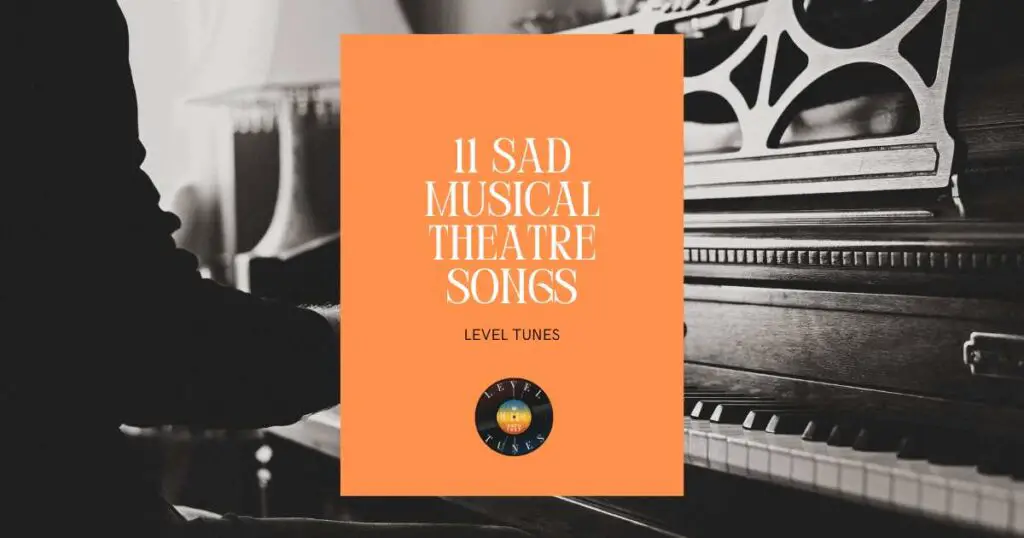11 Sad Musical Theatre Songs: Broadway Classics
Hey music lovers and fellow DJs, TBone here from Level Tunes!
With over 20 years in the music industry, I’ve had the privilege of experiencing and sharing an incredible range of tunes, but today, I’m diving into a genre that’s close to my heart: musical theatre. Why am I focusing on sad songs, you might wonder?
Well, it’s because they have a unique way of touching our souls, making us feel deeply, and sometimes, they even help us heal.
I’ve handpicked 11 sad musical theatre songs that have not only moved me but are also masterpieces in storytelling and composition.
Whether you’re a die-hard fan of musicals or just love exploring different music styles, I promise these tracks will leave an indelible mark on your heart. Let’s get ready to explore the depth of human emotion through the power of musical theatre!
Here are the sad musical theatre songs that you can check out:
List Of Sad Musical Theatre Songs
Sad musical theatre songs in a list format:
“I Dreamed a Dream” from Les Misérables
Written by Claude-Michel Schönberg (music) and Alain Boublil (lyrics), “I Dreamed a Dream” is a haunting ballad from the 1980 musical Les Misérables. This song is a pivotal moment for the character Fantine, reflecting her lost innocence and shattered dreams. Released on various Les Misérables cast recordings, the 1985 Original London Cast Recording, under the label First Night Records, is particularly poignant. The emotional depth Anne Hathaway brought to the song in the 2012 film adaptation won her an Oscar, showcasing the song’s powerful impact. I chose this song because of its raw emotional power and its ability to connect with anyone who has experienced loss or despair. The melody, combined with its heart-wrenching lyrics, creates a deeply moving experience that resonates well beyond the theater.
“Memory” from Cats
“Memory,” with music by Andrew Lloyd Webber and lyrics by Trevor Nunn, is one of the most iconic songs from the musical Cats (1981). Performed by the character Grizabella, it’s a melancholic reflection on her past glory and the longing for a better tomorrow. The song appears on the 1981 Original London Cast Recording, released by Polydor Records. Its haunting melody and the emotional delivery, especially as performed by Elaine Paige, have made it a timeless piece. “Memory” stands out to me for its universal theme of reminiscence and hope, making it a song that transcends the context of the musical. Its beautiful composition and the way it conveys deep emotion through simple yet powerful lyrics is why it’s on my list.
“Send in the Clowns” from A Little Night Music
Stephen Sondheim’s “Send in the Clowns,” from the 1973 musical A Little Night Music, is a masterclass in songwriting. The song, performed by the character Desirée reflecting on her life’s ironies and missed opportunities, is a poignant moment in the show. It’s part of the Original Broadway Cast Recording, released by Columbia Records. Judy Collins’ popular version brought it to mainstream audiences, but the original context in the musical adds layers of meaning. I’m drawn to this song for its sophisticated lyrics and Sondheim’s ability to capture complex emotions with simplicity and elegance. The song’s introspective nature and the beautiful, melancholic melody make it a standout piece in musical theatre.
“The Music of the Night” from The Phantom of the Opera
Andrew Lloyd Webber’s “The Music of the Night,” with lyrics by Charles Hart, is a captivating piece from The Phantom of the Opera (1986). This song allows the Phantom to express his passion for music and his desire to share this world with Christine. Featured on the 1986 Original London Cast Recording released by Polydor Records, the song stands out for its lush melodies and romantic intensity. Michael Crawford’s original performance brings a hauntingly beautiful quality to the song. I chose it for its ability to transport listeners to another world, showcasing Webber’s talent for composing music that is both sweeping and intimate. The song’s appeal lies in its powerful emotional delivery and the timeless longing it evokes.
“Defying Gravity” from Wicked
Stephen Schwartz’s “Defying Gravity” is the anthem of empowerment from the 2003 musical Wicked. Performed by the characters Elphaba and Glinda, it marks a pivotal moment of transformation and defiance. The song is part of the Original Broadway Cast Recording, released by Universal Music. Idina Menzel and Kristin Chenoweth’s performances are electrifying, embodying the spirit of rebellion and freedom. This song captures the essence of standing up against odds and embracing one’s true identity. Its soaring melodies and inspiring lyrics make it a favorite. I’m drawn to its message of empowerment and the dynamic composition that makes it a powerful and uplifting musical moment.
“Seasons of Love” from Rent
Jonathan Larson’s “Seasons of Love” from the 1996 musical Rent is a heartwarming reflection on how we measure the value of a year in life, emphasizing love above all. Featured on the Original Broadway Cast Recording by DreamWorks Records, this song immediately stands out for its catchy melody and profound lyrics. The ensemble cast, featuring talents like Adam Pascal and Idina Menzel, brings a unique energy that captures the essence of the show’s message about community, love, and loss. What draws me to “Seasons of Love” is its universal message and the way it encourages listeners to reflect on the importance of love and the moments that define our lives.
“Empty Chairs at Empty Tables” from Les Misérables
Another gem from Les Misérables, “Empty Chairs at Empty Tables,” is Marius’ lament for his fallen comrades following the failed revolution. This poignant song, also written by Schönberg and Boublil, appears on the 1985 Original London Cast Recording (First Night Records). The song’s haunting melody and evocative lyrics beautifully convey the pain of loss and the guilt of survival. Performances, particularly by Michael Ball, bring a depth of emotion that is both heart-wrenching and beautiful. I chose this song for its powerful expression of grief and the haunting beauty in its melody, which stays with you long after the song ends.
“No One Is Alone” from Into the Woods
Stephen Sondheim’s “No One Is Alone” from the 1987 musical Into the Woods is a beautiful exploration of the complexities of life and the comfort found in togetherness. This song, part of the Original Broadway Cast Recording released by RCA Victor, is a soothing balm in the narrative’s darker moments. Its simple yet profound message about human connection and mutual support in times of trouble speaks volumes. The harmonies and lyrical depth make it a standout. I’m particularly moved by its message that even in our darkest moments, we’re not alone. The song’s gentle melody and the comforting message make it a memorable piece in musical theatre.
“She Used to Be Mine” from Waitress
Written by Sara Bareilles for the 2015 musical Waitress, “She Used to Be Mine” is a powerful ballad sung by the protagonist, Jenna, as she reflects on her lost dreams and hopes for the future. The song is a highlight of the Original Broadway Cast Recording, released by DMI Soundtracks. Bareilles’ own performances bring a personal and heartfelt touch to the song, though Jessie Mueller’s rendition on the cast album is equally moving. The song resonates with anyone who has faced regret or yearned for a different life. I love it for its raw honesty, beautiful melody, and the emotional depth it brings to Jenna’s story.
“If I Loved You” from Carousel
Rodgers and Hammerstein’s “If I Loved You” from the 1945 musical Carousel is a classic duet between the characters Billy Bigelow and Julie Jordan. This song, featuring in numerous recordings, including the 1945 Original Broadway Cast Recording released by Decca Broadway, explores the characters’ feelings for each other in a hesitant yet profound way. The melody is timeless, and the lyrics capture the complexity of love and vulnerability. Performances by John Raitt and Jan Clayton have set a high standard, but each rendition brings its own beauty. This song’s enduring appeal for me lies in its subtle exploration of love’s depth and the fear of expressing it.
“Who Lives, Who Dies, Who Tells Your Story” from Hamilton
Lin-Manuel Miranda’s “Who Lives, Who Dies, Who Tells Your Story” is the poignant finale of the 2015 musical Hamilton, focusing on legacy and how stories are preserved. Part of the Original Broadway Cast Recording released by Atlantic Records, it beautifully wraps up the narrative while asking profound questions about memory and history. The ensemble cast, led by Renée Elise Goldsberry, delivers a moving tribute to Alexander Hamilton’s legacy, emphasizing the role of those left behind in shaping history. I chose this song for its thought-provoking lyrics and the emotional weight it carries, providing a perfect closure to a revolutionary musical. The way it blends historical context with universal themes of legacy and love is truly remarkable.
Fun Facts: Sad Musical Theatre Songs
“I Dreamed a Dream” from Les Misérables
- Fun Fact: Susan Boyle’s rendition of “I Dreamed a Dream” during her audition for “Britain’s Got Talent” in 2009 went viral, significantly boosting her music career. This performance not only showcased her incredible vocal talent but also rekindled public interest in “Les Misérables”, proving the timeless appeal of the song.
“Memory” from Cats
- Fun Fact: “Memory” is considered one of Andrew Lloyd Webber’s greatest hits, covered by over 150 artists worldwide. Notably, Barbra Streisand’s version of the song became a chart-topping hit, further cementing its place in musical theatre and pop music history.
“Send in the Clowns” from A Little Night Music
- Fun Fact: Despite its widespread popularity, “Send in the Clowns” didn’t originally chart when it was first released. It was Judy Collins’ cover in 1975 that brought the song to the mainstream, hitting the Billboard charts and winning the Grammy Award for Song of the Year in 1976.
“The Music of the Night” from The Phantom of the Opera
- Fun Fact: “The Music of the Night” has seen numerous adaptations and performances, but few know that Andrew Lloyd Webber initially composed the melody for a different project before it found its perfect place in “The Phantom of the Opera.”
“Defying Gravity” from Wicked
- Fun Fact: “Defying Gravity” ends the first act of “Wicked” with a literal lift-off. Idina Menzel, who originally played Elphaba, would be hoisted above the stage in a stunning visual effect that symbolizes Elphaba’s ascent and transformation, leaving audiences in awe every time.
“Seasons of Love” from Rent
- Fun Fact: The opening chords of “Seasons of Love” are played at the beginning of the second act of “Rent,” serving as a reminder of the show’s central themes. The song’s powerful message and memorable melody have led it to be performed at numerous memorials and events, transcending its Broadway origins.
“Empty Chairs at Empty Tables” from Les Misérables
- Fun Fact: “Empty Chairs at Empty Tables” is often cited as one of the most emotionally challenging songs to perform in musical theatre, requiring actors to convey deep grief and survivor’s guilt. Michael Ball, who originated the role of Marius in the London production, has spoken about the emotional toll the song takes on performers.
“No One Is Alone” from Into the Woods
- Fun Fact: “No One Is Alone” is considered by many, including composer Stephen Sondheim himself, as one of his most personal and philosophically rich songs. It has been performed in a variety of contexts outside the theatre, including schools, churches, and concerts, as a message of hope and solidarity.
“She Used to Be Mine” from Waitress
- Fun Fact: Sara Bareilles, who wrote “She Used to Be Mine,” performed the role of Jenna in “Waitress” on Broadway, bringing a unique authenticity to the song. Her personal connection to the music and lyrics added an extra layer of emotion to her performances.
“If I Loved You” from Carousel
- Fun Fact: “If I Loved You” is known for its “bench scene” in “Carousel,” which is considered one of the most innovative and seamless integrations of song into a musical’s narrative. This scene has been praised for its naturalistic portrayal of the characters’ emotions and the blossoming of their love.
“Who Lives, Who Dies, Who Tells Your Story” from Hamilton
- Fun Fact: Lin-Manuel Miranda was inspired to write “Hamilton” after reading Ron Chernow’s biography of Alexander Hamilton during a vacation. “Who Lives, Who Dies, Who Tells Your Story” reflects Miranda’s overarching theme of legacy and how history remembers us, making it a fitting conclusion to the musical’s exploration of Alexander Hamilton’s life and impact.
As we conclude our journey through these evocative musical theatre songs, it’s clear that each piece not only showcases incredible artistry but also captures the essence of human emotion. May these songs inspire and move you as much as they have me.
Thanks for reading.
TBone




